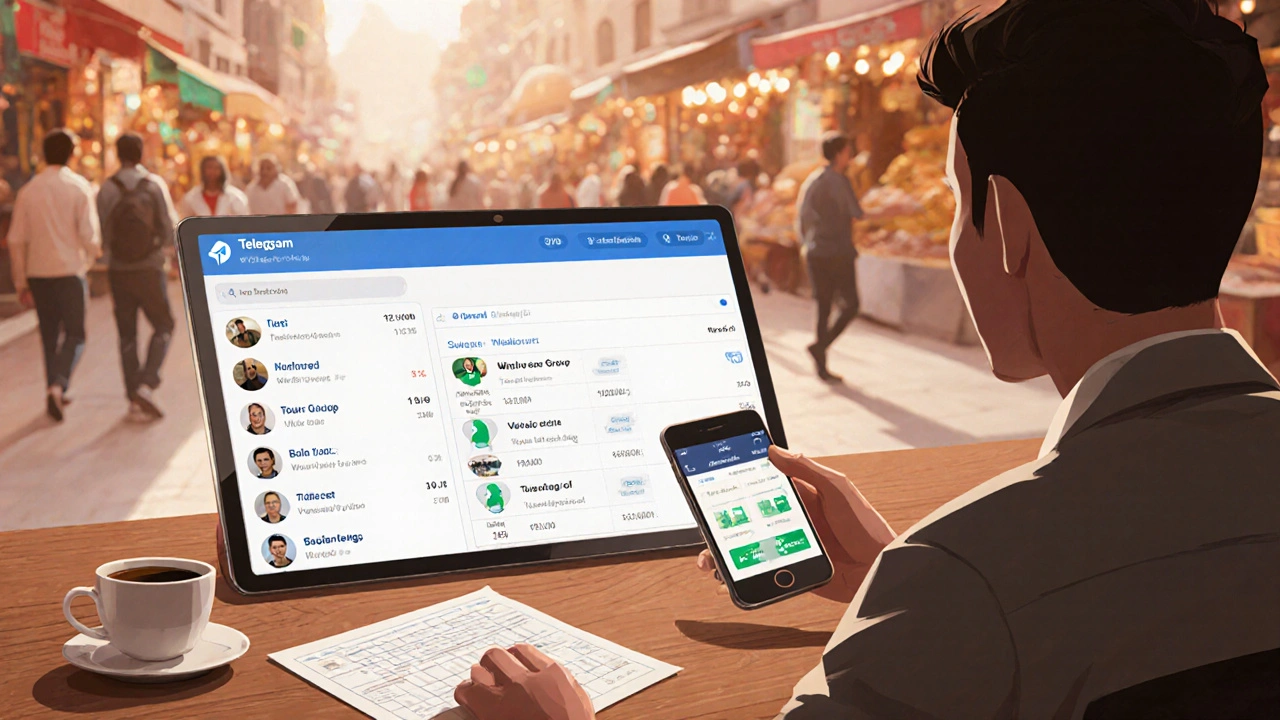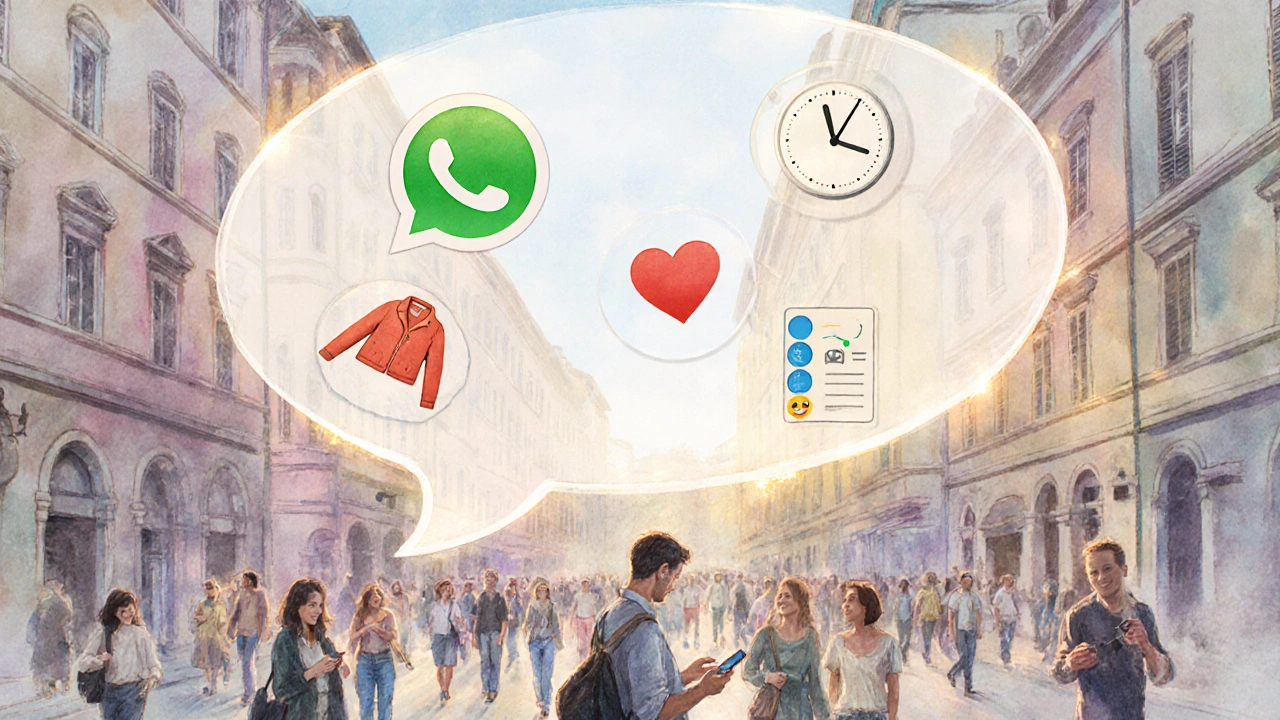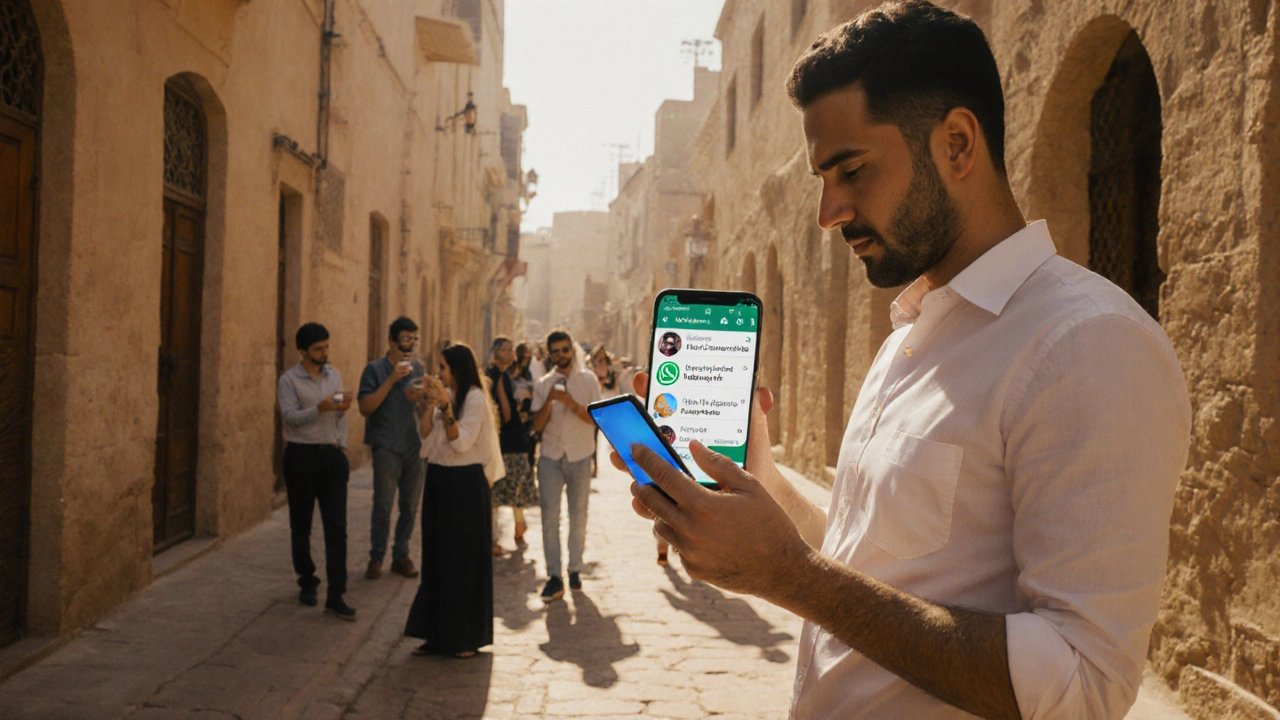Imagine you're leading a group of eight tourists through the narrow alleys of Dubai’s Al Fahidi Historic District. One person is lagging behind, another just texted you they’re feeling dizzy, and a third is asking if the next stop has Wi-Fi. You’re not holding a walkie-talkie or shouting over the crowd. You’re using WhatsApp. And in 2025, that’s not a convenience-it’s the new standard for tour escort services.
Why Messaging Apps Are Replacing Walkie-Talkies
Five years ago, tour guides relied on handheld radios, printed itineraries, and shouted instructions. Today, those tools feel outdated. Tourists don’t want to be herded. They want control. They want to ask questions without interrupting the group. And they want updates without waiting for the next stop.
Platforms like WhatsApp, Telegram, and WeChat let guides send real-time alerts: "We’re leaving the mosque in 5 minutes," "The next café has vegan options," or "Bring a jacket-it’s 10°C cooler inside the museum." No more confusion. No more missed turns. No more frantic hand signals.
A 2024 survey of 320 tour escort operators across the Middle East and Southeast Asia found that 89% switched from radios to messaging apps in the past two years. Why? Because guests rated their experience 42% higher when they could communicate directly with their guide outside of scheduled stops.
How It Works in Practice
It’s not just about sending messages. It’s about structure. Successful tour operators use messaging apps like a command center-with clear rules and roles.
- Before the tour: A group chat is created. Guests are asked to join using their real names (e.g., "Sarah from Canada").
- On day one: The guide sends a quick welcome message with the day’s schedule, emergency contact, and a photo of themselves.
- During the tour: Updates are sent as short voice notes or text bursts. No long essays. No group spam.
- After each stop: A quick poll: "How was the spice market? 👍 or 👎?"-gives instant feedback.
- At the end of the day: A summary recap with photos, next day’s plan, and a thank-you note.
One guide in Istanbul told me she now gets 70% fewer questions on-site because she answers them in advance. "I used to spend half the day repeating the same thing. Now I just paste the answer once in the group."
What Apps Work Best?
Not all apps are equal. Here’s what top tour operators use in 2025:
| App | Best For | Key Feature | Limitation |
|---|---|---|---|
| Global groups, simple setup | Works on all phones, even low-end ones | Can’t schedule messages | |
| Telegram | Large groups, media-heavy tours | Supports 200,000 members, file sharing up to 2GB | Requires users to download app (not pre-installed on iPhones) |
| Chinese-speaking tourists | Integrated payments, mini-programs for tickets | Restricted outside China; needs local number | |
| Signal | Privacy-focused clients | End-to-end encrypted, no ads | No group broadcast feature |
Most operators stick with WhatsApp. It’s the default in 92 countries. Even in places where it’s banned, tourists bring it anyway-because their friends use it. The key isn’t picking the "best" app. It’s picking the one your guests already use.

Real-Time Updates Save Time-and Money
One Dubai-based tour company saw a 30% drop in last-minute cancellations after switching to messaging. Why? Because guests knew exactly what to expect.
Before, people showed up late because they didn’t know the pickup time changed. Now, a simple message: "Pickup moved to 7:30 AM due to traffic. See you at the hotel lobby!"-cuts no-shows.
Another benefit: fewer complaints. When a museum closes early, instead of a dozen angry emails, the guide sends a quick update with a new plan. Guests feel respected. They don’t blame the guide. They blame the museum. And that’s a win.
Operators also save on staffing. One tour leader in Bangkok now runs two small groups simultaneously by using group chats to coordinate. "I don’t need a second guide. I just need a good template," he says.
What Not to Do
Using messaging apps sounds simple. But many guides mess it up.
- Don’t spam. Sending 10 messages an hour makes people mute the group.
- Don’t use emojis as instructions. "👉" doesn’t mean "turn left." Use clear words.
- Don’t ignore private messages. Someone might be sick, lost, or scared. Treat DMs like emergencies.
- Don’t assume everyone speaks English. Use translation tools. Google Translate works fine in WhatsApp chats.
One guide in Kyoto got burned when she sent a joke in English: "The tea house is so quiet, you can hear a pin drop." A guest replied, "I’m deaf. Please type clearly." She now uses plain language and avoids idioms.
Building Trust Through Transparency
The biggest shift isn’t technical. It’s psychological.
Before messaging apps, guides were distant figures-only seen at the bus or the entrance. Now, they’re human. You see their morning coffee photo. You get a heads-up about a sudden rainstorm. You know they’re checking the weather for you.
That builds trust. And trust means repeat customers. One operator in Lisbon told me 60% of her bookings now come from past guests who tagged her in their Instagram stories. "They don’t say ‘I loved the tour.’ They say ‘My guide sent me a map of the best pastel de nata spots.’ That’s the magic."

What’s Next? AI + Messaging
The next wave is automation-without losing the human touch.
Some companies now use simple AI bots to handle FAQs: "Is the temple open on Sundays?" → Bot replies with hours. "Can I bring my dog?" → Bot says "No, but there’s a pet-sitting service nearby."
The guide still handles the emotional stuff: "I’m scared of heights," or "My grandma needs a bench." The bot doesn’t replace the guide. It just takes the busywork off their plate.
By 2026, expect AI to auto-generate daily summaries, translate messages in real time, and even suggest detours based on group mood. But the best guides? They’ll still be the ones who know when to say, "Let’s take a break," or "I’ll walk you back to your hotel."
Getting Started
If you’re a tour escort operator reading this, here’s how to start today:
- Choose one app-WhatsApp is safest for beginners.
- Create a group before the tour starts. Send a welcome message with your photo and name.
- Set ground rules: "No voice notes after 10 PM," or "Only use this chat for tour questions."
- Prepare 5-7 pre-written messages for common situations: delays, weather changes, bathroom breaks.
- Ask for feedback at the end: "Was the chat helpful? What would you change?"
You don’t need a fancy app. You don’t need a tech degree. You just need to listen-and respond.
Can I use messaging apps for private tours only, or do they work for large groups too?
Messaging apps work for both. For private tours, you can use one-on-one chats for personalized tips. For large groups (15+ people), use group chats with clear rules. Telegram supports up to 200,000 members, so even bus tours with 50 people can stay organized. The key is structure-assign one person to moderate, and use pinned messages for important info.
What if some guests don’t have smartphones or don’t want to use apps?
Always have a backup. Keep a printed itinerary and a small walkie-talkie or phone for emergencies. Some older travelers prefer face-to-face updates. Offer to send updates via SMS if they don’t use apps. The goal isn’t to force tech-it’s to give options. Most people will join the chat once they see how much easier it makes things.
Are messaging apps safe for sharing location and personal info?
Yes-if you’re careful. Never share exact addresses or hotel names in public group chats. Use landmarks instead: "We’re near the big blue dome." For location sharing, use WhatsApp’s live location feature only during transit, and turn it off after. Never ask for IDs, passport numbers, or payment details over chat. Keep sensitive info offline.
How do I handle language barriers with international guests?
Use built-in translation tools. WhatsApp has a "Translate" option for every message. For key info-like pickup times or safety warnings-write it in English and one other common language (Spanish, Mandarin, Arabic). You can also use free tools like DeepL or Google Translate to pre-translate your standard messages. Don’t rely on guests to translate for each other. Be the bridge.
Do I need to pay for premium features on these apps?
No. All the core features-group chats, file sharing, voice notes, live location-are free. Premium features like WhatsApp Business (which lets you automate replies) cost money, but you don’t need them to start. Focus on clear communication first. You can upgrade later if you’re running 10+ tours a week.
Final Thought
Technology doesn’t replace the human side of tour guiding. It just makes it easier to be human. A guide who remembers your child’s name, who notices you’re tired, who texts you a photo of the sunset you missed-that’s the guide people remember. Messaging apps don’t change that. They just help you do it better.
